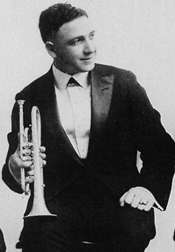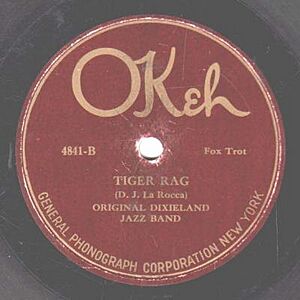Nick LaRocca facts for kids
Quick facts for kids
Nick LaRocca
|
|
|---|---|
 |
|
| Background information | |
| Birth name | Dominic James La Rocca |
| Born | April 11, 1889 New Orleans, Louisiana, United States |
| Died | February 22, 1961 (aged 71) |
| Genres | Dixieland, jazz |
| Occupation(s) | Musician, bandleader |
| Instruments | Cornet, trumpet |
| Years active | 1912–59 |
| Labels | Victor, Okeh, Vocalion, Columbia, Southland |
Dominic James "Nick" LaRocca (born April 11, 1889 – died February 22, 1961) was an American musician. He played the cornet and trumpet. Nick was famous for leading the Original Dixieland Jass Band. Some people even called him "the father of modern jazz." He wrote the famous jazz song "Tiger Rag." His band made history by releasing the first jazz recording, "Livery Stable Blues," in 1917.
Contents
Early Life and Music
Nick LaRocca was born in New Orleans, Louisiana. His parents were immigrants from Sicily. Young Nick loved the music played by brass bands in New Orleans. He secretly learned to play the cornet. His father wanted him to have a different job. At first, Nick worked as an electrician. He played music in his free time.
Joining Bands
From about 1910 to 1916, Nick played in Papa Jack Laine's bands. He was known for playing a strong lead part. He could play for a long time without getting tired. This was helpful for parades and many shows in one day.
In 1916, Nick joined Johnny Stein's band. He was a last-minute replacement for another musician. This band traveled to Chicago, Illinois. Later, this group became the famous Original Dixieland Jazz Band.
The First Jazz Recordings
In 1917, Nick's band made history. They recorded the first jazz music ever released for sale. These recordings were made in New York City. They became very popular. The band members became famous.
Soon, other musicians from New Orleans came to New York. They also wanted to play jazz. Nick LaRocca led his band on tours. They played in England and across the United States.
Taking a Break
In the early 1920s, Nick took a break from music. He went back to New Orleans. He started a business in construction. Another young trumpet player, Henry Levine, took his place in the band.
Later Career and Legacy
In 1936, Nick LaRocca brought the Original Dixieland Jazz Band back together. They had a successful tour. They also made more recordings. Nick said that his band invented swing music, which was very popular then.
The band performed "Tiger Rag" in a newsreel. It was called The March of Time and came out in 1937. The band broke up again in 1937. Nick LaRocca then retired from music for good. He passed away in New Orleans in 1961.
Awards and Recognition
In 2006, one of Nick LaRocca's recordings received a special honor. His 1917 recording of "Darktown Strutters' Ball" was added to the Grammy Hall of Fame. He made this recording with the Original Dixieland Jass Band.
See also
 In Spanish: Nick LaRocca para niños
In Spanish: Nick LaRocca para niños
- Italians in New Orleans
 | Audre Lorde |
 | John Berry Meachum |
 | Ferdinand Lee Barnett |


